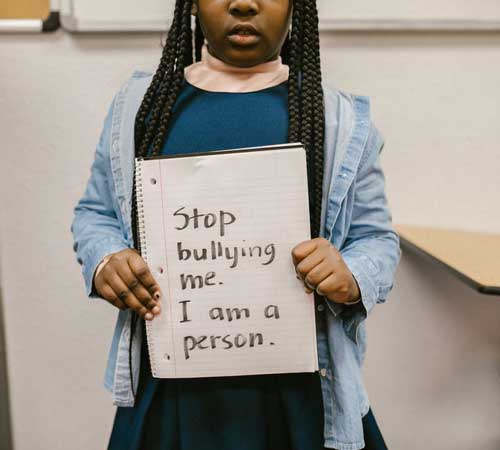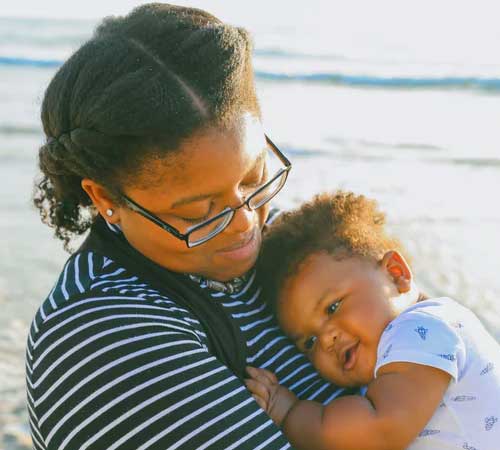Sylvester Oromoni Jnr’s death threw Nigeria into mourning and once more shed light on the dangers of bullying in school.
Bullying is an issue most parents have to address sooner or later on behalf of their child/ren.
As the #JusticeForSylvester hashtag gathers momentum, I thought to come up with this list of how to know if your child is being bullied at school and what to do.
1. Find Out If Your Child Is Being Bullied
The first step in dealing with bullies is realising when your child is a victim.
Typical bullying symptoms include physical complaints such as tummy aches, as well as mini panics, and your child not wanting to go to school.
A normal defense is to withdraw from or avoid things that are making them stressed.
These symptoms are exclusive to bullying, however. You still need to find out what’s going on.
So, ask questions and get your kids talking about their social situation. Know which friends they’re getting along with and the ones they’re not. This is where establishing a good communication channel comes in, so they can seamlessly tell you stuff even before they start having bullying problems.
Aim to keep it very general for the younger kids, but if you suspect a problem or if your child has vocalized a problem, press for more details.
2. Look For Physical Signs Of Bullying
Ensure you examine your child often (I recommend daily) for physical signs of bullying.
If your child is being physically bullied, he/she may manifest unexplained injuries. If you notice any signs as strange cuts, bruises, or scrapes that your child won’t cohesively explain.
Torn or beat up clothing, broken or missing toys, or possessions.
Coming home from school hungry, because some bullies will take money or food from their victims and your child may not be eating lunch.
3. Look For Emotional Or Psychological Signs Of Bullying
Not all forms of bullying involve physical violence.
Verbal taunts (emotional abuse) can be just as damaging as physical attacks. So, watch for any unexplained or sudden changes in your child’s behaviour.
A sudden withdrawal from friends or activities they used to be enthusiastic about. In most cases, this will often center on activities where the bully is present.
For instance, if your child suddenly doesn’t want to go to soccer practice, there could be a bully on the team.
Sudden mood swings or aggression, sudden decline in grades at school, difficulty sleeping, or nightmares are also psychological signs of bullying to look out for.
4. Ask Your Child Directly If They Are Being Bullied
Some kids may not want to talk about it because it feels embarrassing, but a direct question might give them the push they need to open up.
Ask specific questions based on what observations you’ve made.
For instance, state “I’ve noticed you’re coming home from school hungry lately, is someone taking your food?” or “I see that your school bag’s torn. Did someone tear it up?”
It is likely that your child won’t open up right away when you ask. In that case, be sure to leave the lines of communication open and tell your child that you’re always around to talk.
You can also ask your child indirect questions if they won’t answer direct questions.
You could both witness a bullying scene on TV and ask how he feels about that.
5. Encourage Them To Speak Up
And if your child tells you about being bullied, do not belittle or criticise them for it.
Reacting negatively could force your child further into isolation and endanger his or her emotional state.
Instead, listen calmly to what they are telling you.
Say that you believe him/her and that you’re glad he told you because it takes a lot of courage for children to confess this to their parents.
Also Read: 6 1/2 Ways To Keep Kids Learning During School Holidays
Children who are bullied tend to feel alone and isolated, so it’s very important to let your child know you’re always there to help.
You can also encourage your child to use the buddy system.
Bullies are more likely to go after victims when they are alone.
Your child can dodge this by sticking with a friend or classmate whenever he goes somewhere the bully might be.
6. Report The Problem To Your Child’s School
The sad reality is that even with all of your help, your child will still be bullied.
In this case, you should take a step further. Set up a meeting with an admin at your child’s school and report the problem.
If you know who is bothering your child, tell the school admin.
You want to make sure that the school knows who is causing the trouble so they can respond accordingly.
Your child needs to seek help from another adult when you’re not there.
A teacher, principal, or an admin might not even be aware that there is a problem, so you have to report it.
These people can take steps to prevent your child from the bully.
7. Talk To The Bully’s Parents
If you know the bully’s parents, you might have to talk to them if the bullying persists.
They might be unaware that their child has been bothering yours, or they might not care and say that you’re making big a deal of it. You know, that “they’re just kids” speech.
Whatever the case, don’t act accusatory towards the bully’s parents.
Their first instinct will probably be to protect/defend their child.
Also, be prepared to talk to them again.
It’s possible that the bullying won’t stop after this meeting, so prepare to have another talk with them if that’s what it takes.
But if you don’t know the bully’s parents, it’s better to go to the school. Your child’s teachers and/or principal can then approach the bully’s parents on your behalf.
Find more resources on parenting here.




